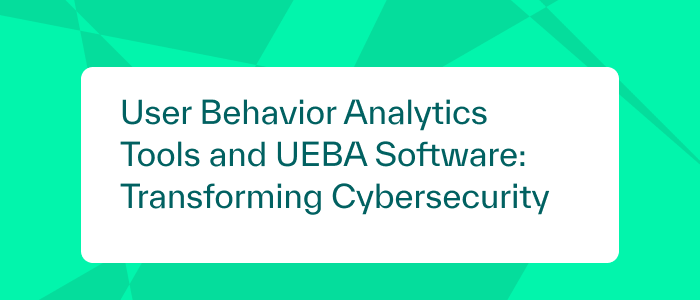
In an era where cyber threats are becoming increasingly sophisticated, organizations are turning to advanced solutions to protect their digital assets. User behavior analytics tools and UEBA software have emerged as powerful allies in the fight against complex security breaches. This is made evident by recent market reports. According to Fortune Business Insights, the global user behavior analytics (UBA) market is currently valued at around $800 million, with projections showing significant growth, potentially reaching $11.5 billion by 2032.
This comprehensive guide explores how these innovative technologies are reshaping the cybersecurity landscape.
User behavior analytics tools are sophisticated software solutions designed to monitor, analyze, and interpret user activities within an organization’s digital environment. These tools leverage advanced algorithms to establish baseline behaviors and identify anomalies that may indicate potential security threats.
Modern user behavior analytics tools employ machine learning algorithms to recognize complex patterns in user activities, enabling the detection of subtle anomalies that might escape traditional security measures.
Assigning risk scores to user actions and anomalies, these tools help prioritize potential threats, allowing security teams to focus on the most critical issues first.
User behavior analytics tools consider various contextual factors, such as time of day, location, and device used, to assess user activities accurately.
User and Entity Behavior Analytics (UEBA) software represents the next evolution in behavior-based security solutions. While user behavior analytics tools focus primarily on human users, UEBA software expands its scope to include entities like devices, applications, and systems.
UEBA software provides a holistic view of an organization’s security landscape by analyzing behaviors across users, devices, and systems.
By leveraging machine learning and AI, UEBA software can identify complex, multi-stage attacks that might evade traditional security measures.
The contextual awareness of UEBA software significantly reduces false positives, allowing security teams to focus on genuine threats.
User behavior analytics tools and UEBA software play a crucial role in identifying and mitigating insider threats, which are often the most challenging to detect using conventional security approaches.
By providing real-time insights into user and entity behaviors, these tools enable faster and more effective incident response, reducing the potential impact of security breaches.
User behavior analytics tools help organizations maintain regulatory compliance by monitoring user activities and providing detailed audit trails, which is crucial for industries with strict data protection, privacy, and other business regulations.
As organizations migrate to cloud environments, cloud-native UEBA solutions are gaining popularity, offering improved scalability and integration with cloud services.
Advanced AI algorithms enable UEBA software to detect threats and predict future security risks based on observed patterns and trends.
UEBA software is being integrated with XDR platforms to provide a more comprehensive and coordinated approach to threat detection and response across multiple security layers.
Address data privacy concerns by implementing strong data governance policies and ensuring compliance with relevant regulations.
Choose solutions that can scale with your organization’s growth and adapt to changing security needs.
Regularly fine-tune your user behavior analytics tools and UEBA software to minimize false positives while maintaining high detection rates.
As we look ahead, user behavior analytics tools and UEBA software are poised to become even more integral to organizational security strategies. We can expect to see:
Why Gurucul UEBA?
✅ AI-Driven Behavioral Analytics – Establishes baselines, detects anomalies, and assigns dynamic risk scores
✅ Detect Insider Threats – Identifies privileged access misuse, data exfiltration, and suspicious employee behavior
✅ Reduce False Positives – Uses machine learning and model chaining to reduce noise and surface real threats
✅ Real-Time Threat Detection – Stops threats before they escalate with automated response workflows
✅ Seamless Integration – Works with SIEM, SOAR, IAM, and cloud security tools for end-to-end visibility
Gurucul’s UEBA is a powerful AI-driven solution designed to detect insider threats, compromised accounts, and anomalous behavior across an organization’s IT environment. By continuously monitoring user activity, access patterns, and entity behaviors, Gurucul establishes dynamic baselines and assigns risk scores to identify deviations that indicate potential threats. Whether it’s privileged access abuse, unauthorized data exfiltration, or lateral movement by an insider or compromised account, Gurucul UEBA surfaces high-risk activities in real time, reducing alert fatigue and enabling security teams to act faster.
Unlike traditional rule-based SIEMs, Gurucul uses behavioral analytics, model chaining, and contextual insights to distinguish between normal user actions and truly malicious behavior. The platform provides 360-degree visibility into insider risks, proactively detecting employees attempting to steal sensitive data, misuse credentials, or engage in fraudulent activities. With automated response workflows, integration with SOAR platforms, and forensic investigation tools, Gurucul UEBA ensures security teams can quickly investigate, prioritize, and mitigate threats before they escalate into a serious breach.
User behavior analytics tools and UEBA software represent a significant leap forward in cybersecurity technology. By providing deep insights into user and entity behaviors, these solutions enable organizations to detect and respond to sophisticated threats more effectively than ever before. As the cybersecurity landscape continues to evolve, embracing these advanced analytics tools will be crucial for organizations looking to stay ahead of emerging threats and protect their invaluable intellectual property and digital assets.
